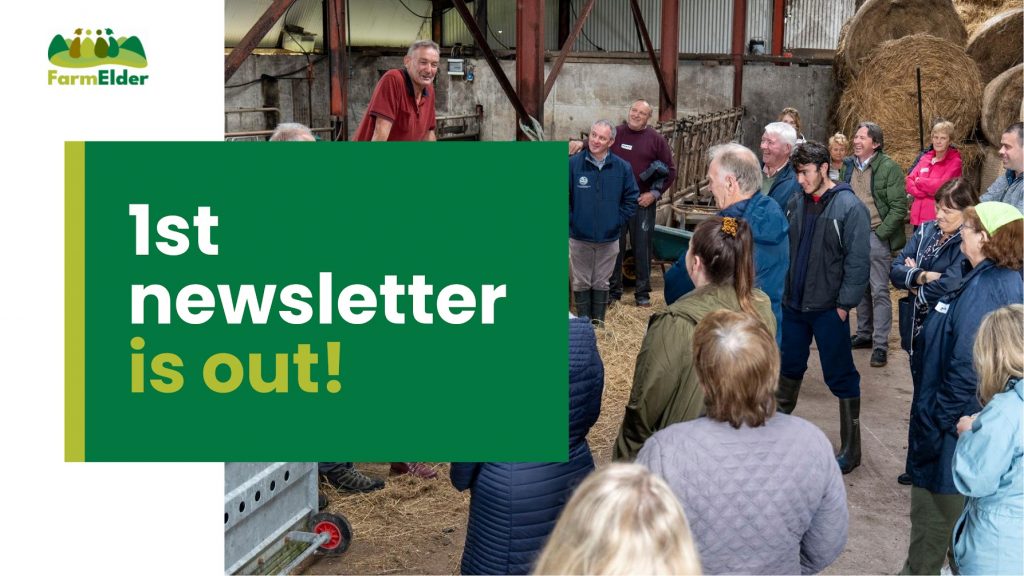FarmElder Anfänge
Die Idee, die Möglichkeiten der Sozialen Landwirtschaft für ältere Menschen zu untersuchen, entstand während der Arbeit an dem von Erasmus+ finanzierten Projekt FARCURA. Während unserer Arbeit an diesem Projekt begannen wir zu erkennen, wie die Soziale Landwirtschaft einige der wichtigsten Bedürfnisse unserer wachsenden Bevölkerung älterer Menschen erfüllen könnte. Einige der Bedürfnisse, die wir in unserer Voruntersuchung identifizierten, waren:
- Die Bevölkerung in Europa altert schnell;
- Die derzeitigen Modelle für Pflegeheime entsprechen nicht den Bedürfnissen vieler älterer Menschen;
- Es müssen sinnvolle Aktivitäten entwickelt werden, um das aktive Altern zu erleichtern;
- Das Fehlen einer Verbindung zwischen den Generationen führt dazu, dass ältere Menschen nicht in der Lage sind, ihren vollen Beitrag zur Gesellschaft zu leisten.
Mit unserem Projekt FarmElder wollen wir zeigen, wie die Soziale Landwirtschaft diese Bedürfnisse erfüllen kann. Unsere Projektpartner aus Irland, Portugal, Deutschland, Slowenien und Belgien werden zusammenarbeiten, um die Probleme zu untersuchen, mit denen ältere Menschen konfrontiert sind, und um Lösungsansätze und positive Beispiele aus den beteiligten Ländern vorzustellen. Im Rahmen des Projekts werden 14 Fallbeispiele sowie Berichte über die Herausforderungen, mit denen ältere Menschen in jedem der teilnehmenden Länder konfrontiert sind, erstellt.
Wir haben auch ein besonderes FarmElder Stories-Element in das Projekt integriert. Hier stellen wir einige der inspirierenden Fallstudien zur Sozialen Landwirtschaft für ältere Menschen in einer Reihe von Kurzfilmen vor.
Berichte
Unsere vier nationalen Berichte und der europäische Bericht zeichnen ein Bild der demografischen Herausforderung, vor der Europa in den nächsten 5 Jahren steht. Sie werden ergänzt durch einen zusammenfassenden Bericht, während die einzelnen Berichte mehr ins Detail gehen.
Einige der wichtigsten Erkenntnisse aus den Berichten sind:
- Laut Eurostat könnte der Anteil älterer Menschen (über 65) an der Gesamtbevölkerung in der Europäischen Union bis 2050 fast 30 % erreichen, gegenüber 19 % im Jahr 2018;
- Die größten Herausforderungen für ältere Menschen sind die körperliche und geistige Gesundheit, die Verfügbarkeit angemessener Gesundheitsdienste, Armut, soziale Isolation und die Bereitstellung angemessener und geeigneter Pflege;
- Gesundheitliche und soziale Ausgrenzung wie Einsamkeit, soziale Isolation, soziale Ausgrenzung, mangelndes Engagement und geringe körperliche Aktivität sind anerkannte Risikofaktoren für Krankheiten und Sterblichkeit bei älteren Menschen. Die Soziale Landwirtschaft bietet therapeutische Aktivitäten, die diese Risiken angehen und die Lebensqualität, die sozialen Beziehungen, die Teilnahme an Aktivitäten und die körperliche Aktivität erheblich verbessern können.
Fallstudien
Zusammen mit den Berichten wurden 14 Fallstudien erstellt, die einen faszinierenden Einblick in kreative Modelle geben, die die Soziale Landwirtschaft an die Bedürfnisse der älteren Menschen anpassen. Zu diesen Modellen gehören;
- Ein Bauernhof in Deutschland, der sowohl pädagogische Programme für Kindergärten und Schulen, als auch Tagesbesuche für ältere Menschen mit Demenz und ihre Familien anbietet.
- Ein generationenübergreifendes Tagesbetreuungsprojekt auf einem Betrieb der Sozialen Landwirtschaft im ländlichen Slowenien, das älteren Menschen ein sinnerfülltes Leben ermöglichen soll, indem es ihren Pflege- und Aktivitätsbedarf deckt und es ihnen ermöglicht, so lange wie möglich zu Hause zu leben.
- Ein Dorf in Portugal, dessen ältere Bewohner durch eine innovative Mischung aus ehrenamtlichem Engagement, gemeinschaftlicher Unterstützung und sozialer Landwirtschaft dabei unterstützt wurden, weiterhin dort zu leben.
- Ältere Landwirte in Irland, die ihre sozialen Kontakte durch das Angebot von Sozialer Landwirtschaft für Menschen mit Behinderungen verbessern.
Lesen Sie die Fallstudien hier
FarmElder Stories
Wir freuen uns sehr auf unsere FarmElder Stories. Mosaic, einer unserer slowenischen Partner, erstellt eine Reihe von Kurzvideos, um einige der inspirierenden Fallstudien, die wir bei unseren Recherchen gefunden haben, vorzustellen. Die Videos werden zeigen, wie innovativ einige Partnerländer die Soziale Landwirtschaft einsetzen, um die Bedürfnisse älterer Menschen zu erfüllen.
Projektpartner
Die FarmElder-Projektpartner kommen aus Irland, Slowenien, Deutschland, Portugal und Belgien. Die meisten Partner haben bereits Erfahrung mit einem Aspekt der Sozialen Landwirtschaft und sind sehr daran interessiert, dass diese spannende Form der sozialen Aktivität in ihren Ländern und in der gesamten Europäischen Union weiter verbreitet wird. Unsere Partner sind:
- Technological University of the Shannon (TUS) – eine Hochschuleinrichtung in Irland.
- Biotechnisches Zentrum Naklo aus Slowenien – eine Erwachsenenbildungs- und Forschungseinrichtung.
- Hof und Leben GmbH – ein unabhängiges KMU mit Sitz in Deutschland, das sich auf die Unternehmensberatung für landwirtschaftliche Familienbetriebe konzentriert.
- Hochschule für nachhaltige Entwicklung Eberswalde – eine Hochschule in Brandenburg mit einem Schwerpunkt zu ökologischer Landwirtschaft.
- European Landowners Organisation – vertritt in Belgien die Interessen von Landbesitzern, Waldbewirtschaftern und ländlichen Unternehmern auf europäischer politischer Ebene.
- Mozaic Association – setzt sich aktiv für die soziale Eingliederung sozial schwacher Gruppen in der ländlichen Region Pomurje, Slowenien, ein.
- South Kerry Development Partnership Ltd – eine Organisation zur Entwicklung des ländlichen Raums, die im Süden Irlands ein Projekt der Sozialen Landwirtschaft betreibt.
- ADRIMAG – eine gemeinnützige Organisation, deren Ziel es ist, die lokale Entwicklung zu fördern und Möglichkeiten zur Verbesserung der Lebensqualität für die Menschen in 7 Gemeinden in Portugal zu schaffen.
Und wie geht es weiter?
Auf der Grundlage der Erkenntnisse aus den Berichten und Fallstudien arbeiten die Projektpartner an einer Reihe von Modulen, um
Lerninhalte zur Sozialen Landwirtschaft mit älteren Menschen online verfügbar zu
machen.
Folgen Sie uns!
Bleiben Sie auf dem Laufenden, indem Sie unsere Website oder uns auf Twitter folgen.


